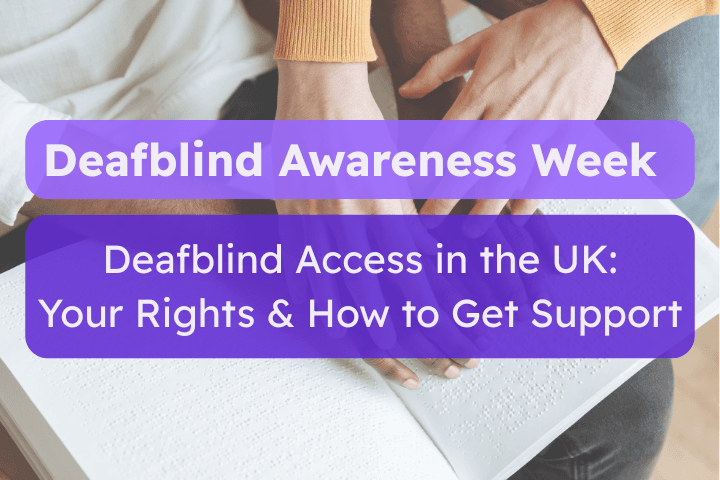All Articles
3 min read
Deafblind Awareness Week 2025 – Deafblind Access in the UK: Your Rights & How to Get Support
Written by
Purpl
Published on
June 24, 2025

Deafblindness is more common than you might think — and it’s not always total vision and hearing loss. It’s a spectrum, and for over 400,000 people in the UK, it means navigating a world that often isn’t built with them in mind.
So, in honour of Deafblind Awareness Week 2025 let’s fix that. Whether you’re deafblind, supporting someone who is, or just want to be a better ally, here’s what you need to know about your rights, the support you’re entitled to, and how to actually get it.
First Things First: What is Deafblindness?
It’s a combined sight and hearing loss that affects your ability to communicate, get around, and access information. Some people are born deafblind (congenital), others become deafblind later in life (acquired). It can be mild or profound, and it’s not always visible — which makes awareness even more important.
Your Rights as a Deafblind Person in the UK (Yes, You Have Them!)
If you’re deafblind in the UK, you’re legally protected under the Equality Act 2010. That means services, employers, and public spaces must make reasonable adjustments to help you access them — from accessible formats and tech, to communication support.
Other key rights:
- Free needs assessments from your local council
- Social care support tailored to dual sensory loss
- Access to Work funding if you’re employed or job seeking
- Reasonable adjustments in education, housing, public transport, and healthcare
Benefits and Discounts You Might Be Entitled To
Being deafblind often means higher living costs — whether that’s transport, specialist tech, or needing extra help day-to-day. These can help ease the pressure:
- Personal Independence Payment (PIP): Available for working-age adults with extra care or mobility needs.
- Attendance Allowance: For those over State Pension age with care needs.
- Disabled Persons Railcard: ⅓ off train travel for you and a companion.
- Access to Work: Covers communication support, interpreters, assistive tech and more — so you’re not out of pocket just for being able to do your job.
- Council Tax Reduction: If you need a live-in carer or home adaptations.
How to Get Support
Getting help shouldn’t feel like a full-time job, but we know it often does. Here’s a shortcut to where you can actually get support:
Social services: Ask your local authority for a deafblind assessment. They’re legally required to provide tailored help for dual sensory loss.
Charities that get it:
- Deafblind UK: Emotional support, practical advice, befriending services.
- Sense: Support for all ages, from social groups to legal advice and family services.
- [RNIB & RNID](https://www.rnib.org.uk / https://rnid.org.uk): Help with tech, communication aids, and rights advice.
- Scope: Disability advice line and help navigating benefits or discrimination.
If You’re Not Getting the Help you Deserve…
Don’t just sit and wait for the system to catch up.
- Appeal decisions (like PIP refusals — they can get it wrong)
- Use advocacy services if communication is a barrier
- Make noise — speak to your MP, file complaints, or get legal advice
Final thought
Being deafblind doesn’t make you “less than” — it just means the world wasn’t designed with you in mind. But your access, rights and voice matter. We, at Purpl, are here to help you fight for them.

Sammi is autistic, has ADHD, and lives with POTS. She’s passionate about disability advocacy, accessibility, and creating spaces where people feel seen, heard, and understood. With a sharp sense of humour and a deep love for community, she speaks openly about the realities of being neurodivergent across all of her personal platforms, always aiming to challenge stigma, spark conversations, and remind others they’re not alone.
Other articles you might like:
Raising Children With Disabilities: Advice, Experiences, and UK Resources
“You Don’t Look Disabled!” Our Survey on Disability and Taboos
Disability Rights UK
Positive Talk About Disability in the Workplace
